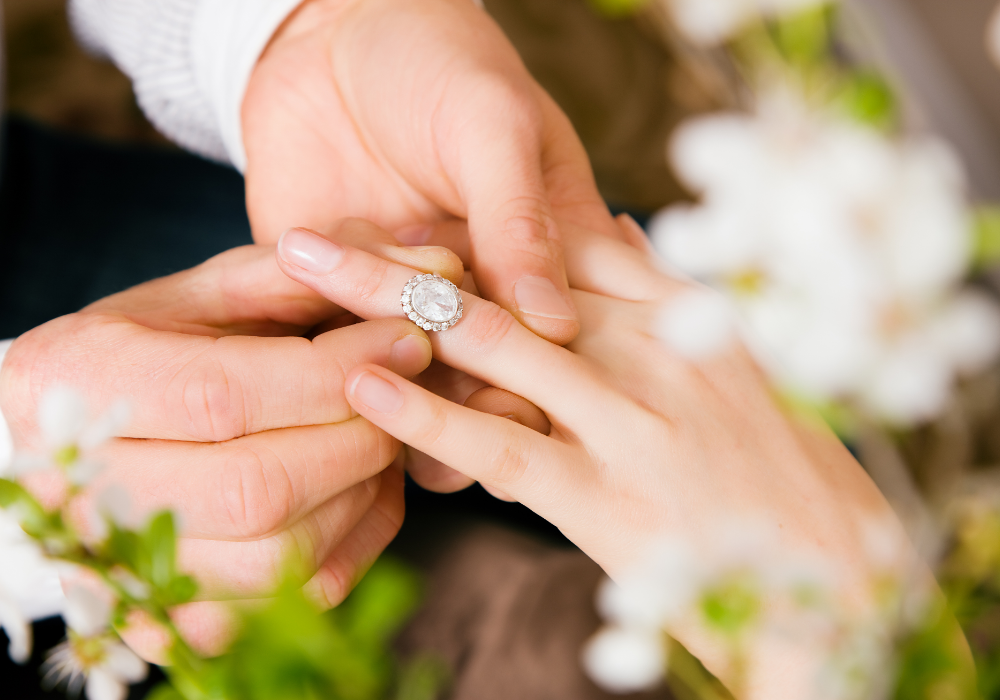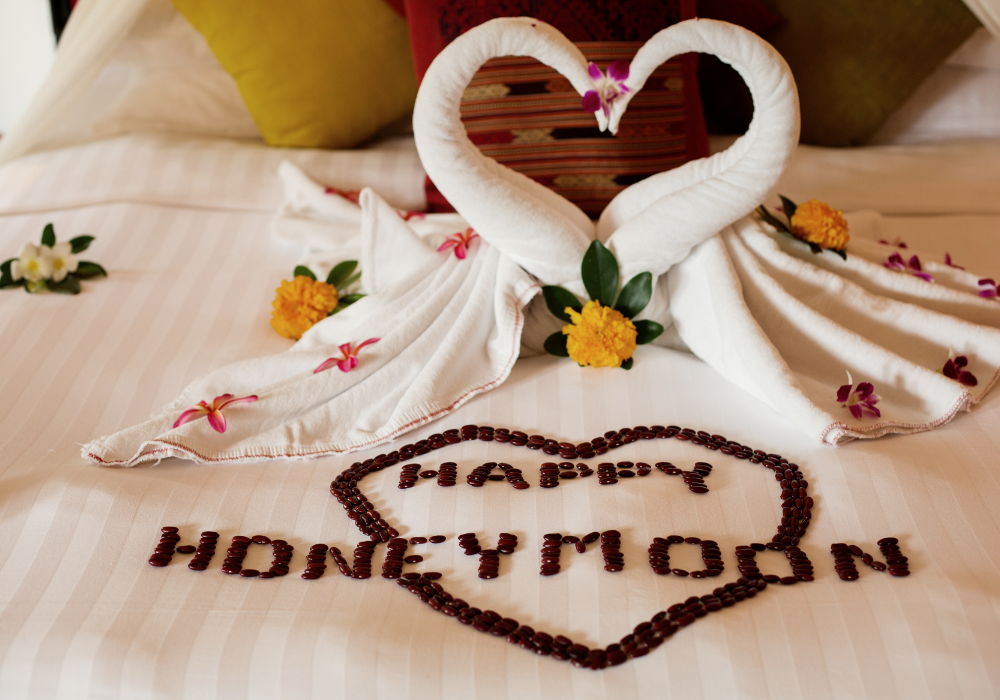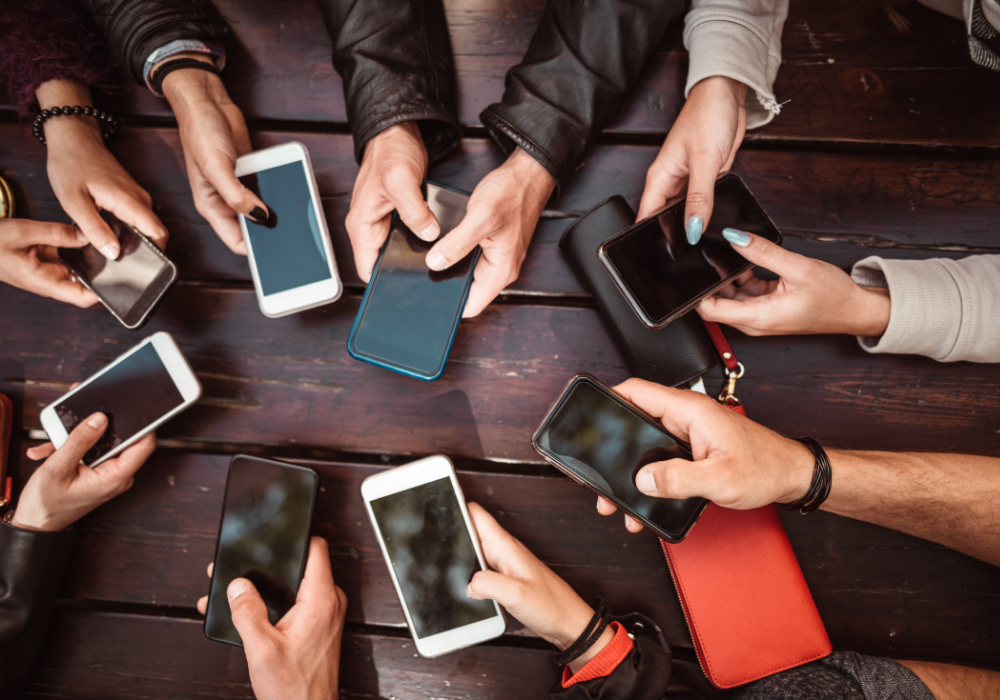When real love is enough the romance industry falls apart.

Love is supposed to be simple, but consumer culture couldn’t leave it alone. Instead of letting connection grow naturally, it turned romance into a never-ending checklist. Perfect dates, grand gestures, luxury gifts, Instagram-worthy milestones—it’s all carefully designed to make you feel like real love is never quite enough. There’s always something bigger, shinier, and more expensive you’re supposed to be chasing. And the more you chase it, the more money they make.
The truth is, real relationships don’t need half the stuff they’re selling you. They don’t need matching pajamas for Valentine’s Day or an elaborate engagement staged for social media likes. But the industry doesn’t make billions off people who are already content. It needs you feeling insecure, pressured, and a little bit lacking. Once you see the game, it gets a lot easier to stop playing—and start appreciating what’s actually real.
1. Engagement rings convinced you love needs a price tag.

For most of history, engagement rings weren’t even a thing. According to Bourree Lam for The Atlantic, De Beers’ marketing campaign in the mid-20th century successfully linked diamonds with romance, turning engagement rings from a rare tradition into a near-universal expectation. Now, people are expected to drop two or three months’ salary on a shiny rock just to prove their commitment.
It’s genius from a business standpoint—manufacture a new tradition, shame people into believing it’s essential, and profit forever. The truth is, love doesn’t need a piece of jewelry to be real. It’s not about how much you spend. It’s about what you build together afterward. But when culture keeps drilling the message that expensive equals meaningful, it’s hard not to feel like you’re missing out without that glittering proof on your hand.
2. Valentine’s Day turned love into a timed performance.

Valentine’s Day sounds sweet on paper—a day to celebrate love. In reality, it’s become a massive commercial event that creates pressure, expectations, and a whole lot of unnecessary disappointment. Flowers, chocolates, fancy dinners, hotel stays—if you’re not going all out, are you even doing it right? That’s the vibe they want you to buy into.
Love isn’t a one-day performance that requires balloons and a reservation. Per Will Granados for the National Retail Federation, U.S. consumers are expected to spend a record $27.5 billion on Valentine’s Day in 2025, up from $25.8 billion in 2024. If you’re in a good relationship, Valentine’s Day feels like a nice bonus. If you’re in a strained one, it can feel like a brutal test you’re destined to fail. Either way, the pressure to perform keeps you spending.
3. Romantic comedies sold you the myth of effortless love.

Rom-coms gave us some iconic moments, but they also sold us some damaging lies. They taught us that love is supposed to be easy, dramatic, and full of grand gestures that somehow work out perfectly in the end. Elisabetta Molteni for The Oxford Blue states, romantic comedies often lead viewers into a cycle of unrealistic expectations and disappointment by portraying idealized versions of love that don’t reflect real-life relationships.
When your actual relationship doesn’t look like a movie montage, it’s easy to wonder if something’s wrong. Consumer culture loves this confusion because it keeps you looking for upgrades—new outfits, better dates, more relationship advice.
If love feels too ordinary, there must be something missing, right? Wrong. Real love isn’t effortless. It’s built in tiny, unglamorous ways, not in a rain-soaked airport confession or a choreographed flash mob at the park.
4. Luxury honeymoons turned starting a marriage into a spending competition.

Once the wedding is over, the pressure doesn’t stop. Now it’s about the honeymoon—how exotic, how Instagrammable, how jaw-droppingly expensive you can make it. It’s not enough to simply celebrate each other. You have to jet off somewhere remote, exclusive, and eye-wateringly pricey to “prove” you’re off to the perfect start.
Consumer culture thrives on turning life milestones into financial milestones. A quiet weekend road trip could be just as special, but it doesn’t fuel the luxury travel industry. They need you believing that if your honeymoon isn’t worthy of a magazine spread, your marriage is somehow starting on the wrong foot. Real connection doesn’t need a first-class ticket. It needs two people who actually want to be there with each other, no matter the view.
5. Dating apps turned connection into a shopping experience.

At first glance, dating apps seem like a great way to meet people. Swipe, match, message—it’s all so easy. But look a little closer, and you’ll see how they subtly turned finding love into browsing for a product. People become profiles, options become endless, and real connection starts to feel replaceable.
The more you swipe, the less special anyone feels. And that’s the point. Dating apps don’t make money when you find love and delete the app. They make money when you keep chasing, keep matching, and keep feeling like maybe, just maybe, the next person will finally be the “perfect” one. By turning romance into a consumer choice, they make sure you’re always shopping—and rarely settling into anything real.
6. Relationship milestones became a checklist instead of a journey.

Consumer culture loves turning natural moments into tasks you have to hit on a timeline. First trip together. Moving in. Getting a dog. Getting engaged. Buying a house. Every stage gets tied to products, services, and industries ready to cash in on your “next step.” Suddenly, love isn’t just about growing together—it’s about proving you’re moving fast enough.
When you start viewing your relationship through the lens of milestones, it stops being about how you feel and starts being about how you look to everyone else. Are you behind? Are you ahead? Are you Instagram official yet? This pressure has nothing to do with real connection and everything to do with creating endless reasons to buy, upgrade, and celebrate in ways that feed businesses instead of your bond.
7. The perfect proposal became a public spectacle.

Once upon a time, proposing meant asking a simple question in a meaningful moment. Now it’s a full production: hidden photographers, drone footage, custom rings, flash mobs, and destination surprises. The bigger and more dramatic, the more “meaningful” it’s supposed to seem. But who really benefits from turning a private commitment into a public performance?
The pressure to craft a viral proposal isn’t about your love story—it’s about selling venues, videographers, jewelry upgrades, and social media bragging rights. It turns what should be a deeply personal decision into a curated moment for other people’s approval. Real love doesn’t need a five-figure production budget. It needs honesty, intention, and two people who actually want the same future.
8. Holiday marketing makes you feel like bad gifts mean bad relationships.

Every holiday season, the same ads start rolling out. If you really love her, you’ll buy the car with the giant bow. If you really love him, you’ll spring for the fancy watch or the designer cologne. Somehow, your gift choices become the official measurement of your relationship’s worth. Forget thoughtfulness—go big or go home.
This mindset turns meaningful moments into transactions. If you don’t spend enough, if you don’t guess perfectly, if you don’t wow them with luxury, the fear is that maybe you don’t care enough.
But love can’t be measured in price tags, and real relationships don’t crumble over missing a Black Friday deal. The industry needs you to believe love is something you prove with purchases. The truth is, it’s something you show every day without a receipt.
9. Wedding culture sells the idea that bigger equals better.

Getting married should be about building a life together, but somewhere along the way, it became about building an event. Expensive dresses, designer invitations, luxury venues, curated playlists, signature cocktails—the list never ends. The bigger the spectacle, the more “successful” the wedding is supposed to feel.
This mindset turns a personal commitment into a competitive performance. The wedding industry thrives when couples believe they need to deliver an unforgettable experience, not just to each other, but to everyone watching. But real commitment isn’t about one perfect day. It’s about all the days after, the ones without a crowd or a color-coordinated backdrop. The best part of a wedding isn’t the spectacle. It’s the quiet decision to stay when no one is clapping.
10. Social media pressures you to perform your relationship.

Social media doesn’t just document relationships anymore—it stages them. Anniversary posts, vacation selfies, matching outfits, public declarations of love. Every moment becomes content. And if you don’t post about it, does it even count? That’s the trap they set up without you even noticing.
The constant pressure to perform your happiness online can make a perfectly healthy relationship feel somehow incomplete. You start wondering if you should be doing more, showing more, celebrating more.
Meanwhile, companies are right there to sell you everything you need to create the next perfect post. Real love doesn’t need an audience. It needs trust, presence, and moments that feel special because they are, not because they’re broadcast to the world.
11. “Self-love” became another excuse to sell you stuff you don’t need.

Self-love should be about acceptance, growth, and taking care of yourself in ways that actually matter. But consumer culture saw a goldmine and turned it into another shopping spree. Now self-love means buying candles, bath bombs, facial rollers, designer journals, and whatever else they can slap the label onto.
Of course, there’s nothing wrong with treating yourself. But when self-love becomes just another way to sell you more, it stops being empowering and starts feeling like another chore you’re never quite doing right. True self-love doesn’t come from a shopping cart. It comes from learning to like who you are without needing a box of curated products to prove it.